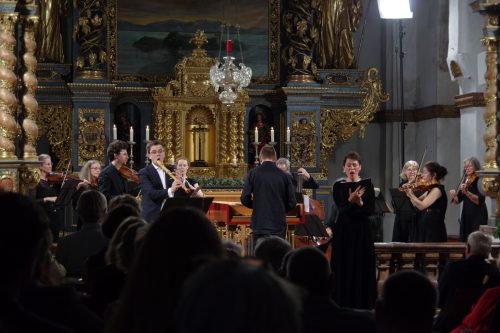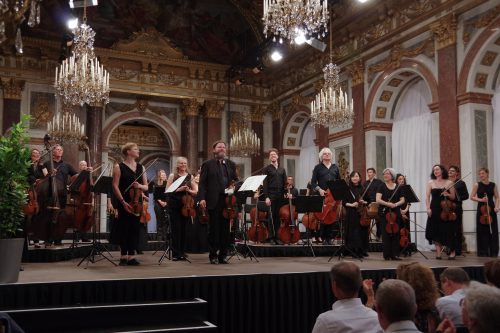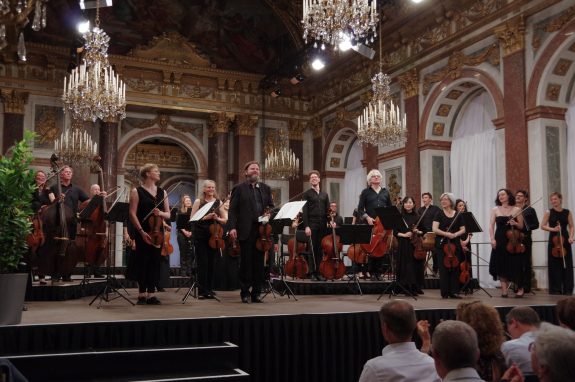 Germany Herrenchiemsee Festspiele 2024: Chiemsee, Germany. (LV)
Germany Herrenchiemsee Festspiele 2024: Chiemsee, Germany. (LV)

The Herrenchiemsee Festival has a history, for the quality of the music, the programming, the musicians and the perfection of the setting: two islands in the largest lake in Bavaria. Herreninsel has one of King Ludwig II’s fairytale castles, called Herrenchiemsee and modeled on the palace at Versailles. Fraueninsel is the site of one of the oldest Christian churches in Europe. The lake is an hour’s train trip from Munich, and a short, idyllic ferry ride brings music and other lovers to the islands. The theme this year was ‘I want to remain an eternal mystery. . .’, reflecting the King’s dying wish. The Festival ran for twelve days beginning on 16 July.
I caught the last ferry to Fraueninsel on 17 July for a concert at the Benedictine monastery, led by the young recorder virtuoso Max Volbers with a chamber ensemble from Concerto Köln. The music was by J.S. Bach and a younger contemporary, Johann Adolph Scheibe. It was billed as ‘Unequal Rivals’ because the otherwise obscure Scheibe had turned critic and accused Bach of being too Italian, too florid for his solid German tastes.
It made no difference to the boyish-looking Volbers, who moved like a recorder-playing cat, crouching and sweeping into musical phrases with his whole body. He played around and improvised when repeating sections that were infused with wild and wonderful riffs. He phrased with a wandering ear for small rhythmic details and reveled in delicious curlicues. Whether playing one of his recorders or leading from the harpsichord, the sounds he and the gorgeous-sounding Concerto Köln were a stunning example of the warmth and colors that only period instruments and inspired soloists can produce.
Volbers began with a pastiche concerto taken from two of Bach’s most familiar concertos, one originally for violin and the other for harpsichord, and each movement seemed to prove the point Scheibe was trying to make. Although in such an immersion in sound and style it became difficult at times to sort out one composer from the other – who cared? It was a time when such issues mattered, and a cat could look at a king.
The musical riches were multiplied whenever Laila Salome Fischer used her dark-toned mezzo-soprano to surge unexpectedly with emotion, then soothe with tender delicacy. In both Scheibe and Bach, she filled the church with her voice of many vibrant colors, wonderfully full of life, her sweet spots aligning perfectly with Concerto Köln’s vibrant playing and the church’s resonance. Carla Blessing’s performance of Scheibe’s totally obscure and totally beguiling Concerto for Oboe d’amore was equally miraculous. Her plaintive tone, the sound of a simple soul, blended in with Concerto Köln at the top of their game, rich and clear at the same time, filling out the music’s harmonies as if engaging in an intimate private dialogue.

The following night, the concert was in the Hall of Mirrors at the Herrenchiemsee Palace, where the period instrument Orchestra of the Eighteenth Century took a while to get into proper stride, as if they were caught in a time warp between Haydn and Beethoven. They opened with Cherubini’s introduction to the cantata he wrote on hearing about the death of Haydn, based on a report that was, like Mark Twain once said, ‘an exaggeration’. Although it was beautifully played, it was a little incongruously dour for the occasion.
The orchestra switched gears for the first (despite its numbering) of Haydn’s twelve London Symphonies, a purely musical miracle even if musicologists now tell us that it was at the premiere of his Symphony No.102 that a chandelier fell without injuring anyone. Alexander Janiczek at the helm did not take the first movement repeat which shortened the dimensions of its enjoyment, probably more for critics than for the general public. They played as if all the pauses were opportunities to pique the audience’s interest, scored with their rustic phrasing in the Trio, and unleashed Haydn’s inner kettle drummer in the madcap Finale.
After the intermission, the orchestra’s performance of Beethoven’s Symphony No.1 hit its stride at the opening gate. They captured the young stallion champing at the bit to take over the symphonic reins from Haydn, particularly in the Menuetto where the orchestra played as if they understood that this was the birth of the symphonic scherzo. Janiczek took all the repeats there are to take, which heightened the musical impact. The dialogues within the orchestra also became more outwardly directed and engaging. Tempos were on the quick side – they played the concluding Allegro molto e vivace just about as fast as it can go. The last movement of the Haydn was repeated for an encore, and they accomplished what Haydn always intended with his finales, to wake up the audience and send them home happy – which in this case, meant strolling down or taking buses to the docks to catch ferries to the mainland.
In September, Max Volbers will release his Foreign Masters recording of music that was popular in eighteenth-century London, written by composers who did not come from England: Handel, of course, but also Alberti, Carbonelli, Paisible and others who arranged and published well-known English tunes and, in the process, enriched the city’s musical life.
In 2025, the Herrenchiemsee Festival will celebrate its twenty-fifth birthday with special programing and artists. The official announcement will be made in the fall.
Laurence Vittes
17.7.2024, ‘Unequal Rivals’: Max Volbers (recorder), Carla Blessing (oboe d’amore), Laila Salome Fischer (mezzo-soprano), Concerto Köln / Max Volbers (conductor). Münster Frauenchiemsee, Fraueninsel.
J.S. Bach – Concerto per Flauto in C major after the concertos BWV 1042 and 1053; ‘Stumme Seufzer, stille Klagen’ from Mein Herze schwimmt im Blut: Recitative and aria from Cantata BWV 199; Sinfonia from Cantata BWV 182; Cantata BWV 170
Johann Adolph Scheibe – Sinfonia à 4 in A major, SchW A2:005; ‘Willkommen, Heiland’ from Die Auferstehung und Himmelfahrt Jesu, SchW B2:301; Concerto for Oboe d’amore in B minor, SchW A1:009; ‘O tötet mich nur auch, vermessne Scharen!’ from Der wundervolle Tod des Welterlösers, SchW B2:313
18.7.2024, ‘Miracle’: Orchestra of the Eighteenth Century / Alexander Janiczek (conductor). Spiegelsaal, Herrenchiemsee Palace, Herreninsel.
Cherubini – Chant sur la mort de Haydn (Introduction)
Haydn – Symphony No.96 in D major, ‘Miracle’
Beethoven – Symphony No.1 in C major, Op.21
